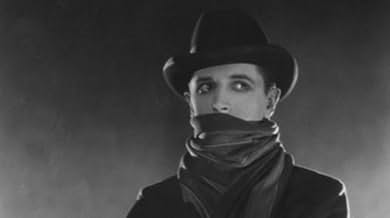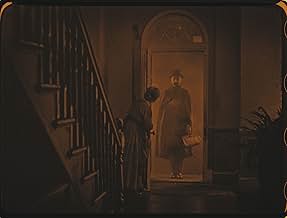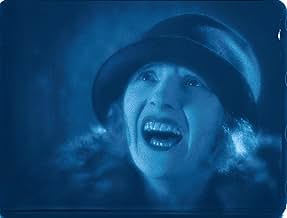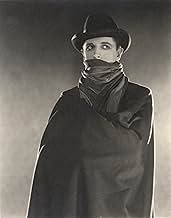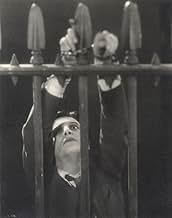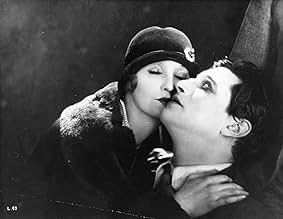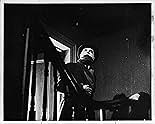NOTE IMDb
7,3/10
14 k
MA NOTE
Une femme soupçonne que son nouveau locataire est le psychopathe qui tue des femmes à Londres.Une femme soupçonne que son nouveau locataire est le psychopathe qui tue des femmes à Londres.Une femme soupçonne que son nouveau locataire est le psychopathe qui tue des femmes à Londres.
- Réalisation
- Scénario
- Casting principal
June Tripp
- Daisy - A Mannequin
- (as June)
Wallace Bosco
- Pub Customer
- (non crédité)
Daisy Campbell
- Mother
- (non crédité)
Maudie Dunham
- First Victim
- (non crédité)
Reginald Gardiner
- Dancer at Ball
- (non crédité)
Eve Gray
- Showgirl Victim
- (non crédité)
Alfred Hitchcock
- Extra in Newspaper Office
- (non crédité)
Alma Reville
- Woman Listening to Wireless
- (non crédité)
Avis à la une
This movie is fantastic and fascinating mostly because of its director, but it would be fun either way. I'd say that it's better than many films of the same period, but not to the same extreme degree that Hitchcock's movies eventually achieved.
You can see it's his work, though. Hitchcock knew that what made a suspenseful movie good had nothing to do with gore or loud noises, and this shows even in his early work. The Lodger has a distinctly Hitchcock feel to it--fun and scary--and it's interesting to see how he gets around the lack of sound, considering the fact that most (all?) of his other films were talkies.
You can see it's his work, though. Hitchcock knew that what made a suspenseful movie good had nothing to do with gore or loud noises, and this shows even in his early work. The Lodger has a distinctly Hitchcock feel to it--fun and scary--and it's interesting to see how he gets around the lack of sound, considering the fact that most (all?) of his other films were talkies.
... a thriller based on the book by Marie Belloc Lowndes. A mysterious killer known as "the Avenger" is terrorizing the streets of London. He targets women with blonde, curly hair, and the police are at a loss to stop him. Meanwhile, a sketchy new lodger (Ivor Novello) takes up residence in the rooming house of a landlady (Marie Ault) and her husband (Arthur Chesney). The landlady becomes convinced that the lodger is really the Avenger, which proves problematic as the lodger has caught the attention of the landlady's daughter, Daisy (June Tripp). Also featuring Malcolm Keen as Daisy's policeman boyfriend.
Inspired by the Jack the Ripper case, this was Hitchcock's first suspense picture, and was an immediate success, with one critic at the time even calling this the "best British film ever made". This is my second time watching it, and the first time watching the beautiful BFI restoration. The quality of the print is outstanding, and the commissioned score is excellent. Hitchcock uses a number of visually impressive double exposure shots, and I also liked the stylized intertitles. I still find the movie a tad too long, and Novello, who looks striking, is a silent-era-style ham, but it's still worth checking out for silent film fans. Arthur Chesney, playing the landlord, was the lookalike younger brother of Edmund Gwenn, and the former husband of Estelle Winwood.
Inspired by the Jack the Ripper case, this was Hitchcock's first suspense picture, and was an immediate success, with one critic at the time even calling this the "best British film ever made". This is my second time watching it, and the first time watching the beautiful BFI restoration. The quality of the print is outstanding, and the commissioned score is excellent. Hitchcock uses a number of visually impressive double exposure shots, and I also liked the stylized intertitles. I still find the movie a tad too long, and Novello, who looks striking, is a silent-era-style ham, but it's still worth checking out for silent film fans. Arthur Chesney, playing the landlord, was the lookalike younger brother of Edmund Gwenn, and the former husband of Estelle Winwood.
A stranger (Ivor Novello) in fog-bound London seeks accommodation from a family and they provide him with a small apartment upstairs. Their blond daughter is drawn towards this fascinating and somewhat mysterious gentleman. Her parents become suspicious of the intentions of the lodger and they live in fear of her safety. There is a serial killer abroad in the foggy streets and who knows? this stranger could be that maniac.
It is interesting to view an early Hitchcock film as far back as the silent era. I am surprised at the quality (despite a few scratches here and there). The addition of music is rather overdone in my opinion but it does fill in the empty silence and does add a dramatic effect. No doubt in the early days a capable pianist (below the screen) bashed out some impromptu music to fit the mood of each scene.
It is an uncomplicated story but that does not mean the guilty person is easily recognized (if at all!) Hitchcock likes to tease with a lodger who has shifty eyes, who paces the floor (what an original idea to photograph through a transparent floor), who has the wall pictures removed and who creeps out silently at night.
I feel that the atmosphere created is exceptional. Certainly a bit theatrical with exaggerated eye expressions but compelling nevertheless.
When you see a film of this vintage you realise how much film production had already advanced in the 20's and without the aid of all our recent technological contrivances.
It is interesting to view an early Hitchcock film as far back as the silent era. I am surprised at the quality (despite a few scratches here and there). The addition of music is rather overdone in my opinion but it does fill in the empty silence and does add a dramatic effect. No doubt in the early days a capable pianist (below the screen) bashed out some impromptu music to fit the mood of each scene.
It is an uncomplicated story but that does not mean the guilty person is easily recognized (if at all!) Hitchcock likes to tease with a lodger who has shifty eyes, who paces the floor (what an original idea to photograph through a transparent floor), who has the wall pictures removed and who creeps out silently at night.
I feel that the atmosphere created is exceptional. Certainly a bit theatrical with exaggerated eye expressions but compelling nevertheless.
When you see a film of this vintage you realise how much film production had already advanced in the 20's and without the aid of all our recent technological contrivances.
Usually remembered as Alfred Hitchcock's first thriller, "The Lodger" is also a very good film in its own right. Although the acting is somewhat dated, and although there is not a really appropriate musical score that has survived, it has the carefully crafted plot and suspense that Hitchcock would become famous for.
The opening sequence uses the director's creative touches in setting the mood of a city terrorized by a mysterious killer, "The Avenger", who is targeting light-haired women. Then we meet the actual characters: an older couple and their daughter Daisy, and Daisy's policeman boyfriend. When a mysterious lodger appears and rents the family's extra room, his strange behavior begins to make them suspect that he might be the mad killer, even as he builds a close friendship with Daisy. As the story proceeds, tension and fear continue to build until an ending that is exciting, if somewhat melodramatic.
Hitchcock shows his mastery of silent film technique in using a wide variety of camera techniques and props to communicate the emotions of the characters. The acting is mostly good, although Ivor Novello as "the lodger" overplays his role rather noticeably. This is the kind of movie that could really benefit from a good musical soundtrack, and the fact that it is exciting to watch even without an appropriate score shows the quality of Hitchcock's craftsmanship.
Anyone who enjoys Hitchcock or silent films will definitely want to see "The Lodger".
The opening sequence uses the director's creative touches in setting the mood of a city terrorized by a mysterious killer, "The Avenger", who is targeting light-haired women. Then we meet the actual characters: an older couple and their daughter Daisy, and Daisy's policeman boyfriend. When a mysterious lodger appears and rents the family's extra room, his strange behavior begins to make them suspect that he might be the mad killer, even as he builds a close friendship with Daisy. As the story proceeds, tension and fear continue to build until an ending that is exciting, if somewhat melodramatic.
Hitchcock shows his mastery of silent film technique in using a wide variety of camera techniques and props to communicate the emotions of the characters. The acting is mostly good, although Ivor Novello as "the lodger" overplays his role rather noticeably. This is the kind of movie that could really benefit from a good musical soundtrack, and the fact that it is exciting to watch even without an appropriate score shows the quality of Hitchcock's craftsmanship.
Anyone who enjoys Hitchcock or silent films will definitely want to see "The Lodger".
it is a real special film. first - for the status of early Hitchcock. the second - for Ivor Novello performance who seems be more than a good one but the right piece for the balance of film. the story is predictable and this fact did it charming. because old themes are mixed with smart images. because the romanticism and the touching scenes reminds the popular literature of XIX century. because it is fresh and naive and seductive and dark. and because it is a fascinating clue for discover the art of its director in new and interesting perspective.
Le saviez-vous
- AnecdotesFor the opening of this movie, Sir Alfred Hitchcock wanted to show the Avenger's murder victim being dragged out of the Thames River at night with the Charing Cross Bridge in the background, but Scotland Yard refused his request to film at the bridge. Hitchcock repeated his request several times, until Scotland Yard notified him that they would "look the other way" if he could do the filming in one night. Hitchcock quickly sent his cameras and actors out to Charing Cross Bridge to film the scene, but when the rushes came back from the developers, the scene at the bridge was nowhere to be found. Hitchcock and his assistants searched through the prints, but could not find it. Finally, Hitchcock discovered that his cameraman had forgotten to put the lens on the camera before filming the night scene.
- GaffesWhen The Lodger (Ivor Novello) and Daisy (June Tripp) are playing chess, but the board is set up inappropriately. The square in the right corner should always be white. In this case, the bottom-right square is dark (black). This is the most obvious when The Lodger (Ivor Novello) is poking the coals in the fireplace.
- Citations
Joe Betts: Does this lodger of yours mean any harm to Daisy?
The Landlady: Don't be silly, Joe. He's not that sort. Even if he's a bit queer, he's a gentleman.
- Crédits fousClosing credits: Thank you to everyone who supported the BFI's Silent Hitchcock restoration project.
- Versions alternativesThe original version of The Lodger directed by Alfred Hitchcock in 1926 was restored in 1999 in honor of the directors 100th anniversary. The film was restored by the British National Film & TV Archives and a new score by Ashley Irwin was commissioned by ZDF/ARTE (Germany) and premiered on August 13, 1999 (what would have been Hitchcock's 100th birthday).
- ConnexionsEdited into Histoire(s) du cinéma: Une vague nouvelle (1999)
Meilleurs choix
Connectez-vous pour évaluer et suivre la liste de favoris afin de recevoir des recommandations personnalisées
Détails
Box-office
- Budget
- 12 000 £GB (estimé)
- Montant brut mondial
- 83 568 $US
- Durée1 heure 32 minutes
- Couleur
- Mixage
- Rapport de forme
- 1.33 : 1
Contribuer à cette page
Suggérer une modification ou ajouter du contenu manquant

Lacune principale
By what name was Les cheveux d'or (1927) officially released in India in English?
Répondre

